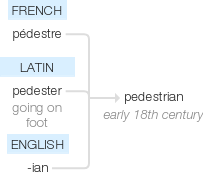Pedestrian
early 18th century: from French pédestre or Latin pedester ‘going on foot’, also ‘written in prose’ + -ian. Early use in English was in the description of writing as ‘prosaic’.
wiktionary
Borrowed from Latin pedester, root pedestri- (from pedes) + -an(suffix forming adjectives).
etymonline
pedestrian (adj.)
1716, "prosaic, dull" (of writing), from Latin pedester (genitive pedestris) "plain, not versified, prosaic," literally "on foot" (sense contrasted with equester "on horseback"), from pedes "one who goes on foot," from pes (genitive pedis) "foot," from PIE root *ped- "foot." Meaning "going on foot" is attested by 1791 in English (it also was a sense of Latin pedester). Earlier adjective pedestrial (1610s) meant "of or pertaining to the foot."
pedestrian (n.)
1793, "a walker, one who walks or journeys on foot," from pedestrian (adj.). In early use especially "one who walks or races on foot for a wager; a professional walker; one who has made a notable record for speed or endurance." In 20c. it came to mean especially "person walking on a road or pavement" as opposed to person driving or riding in a motor vehicle.
